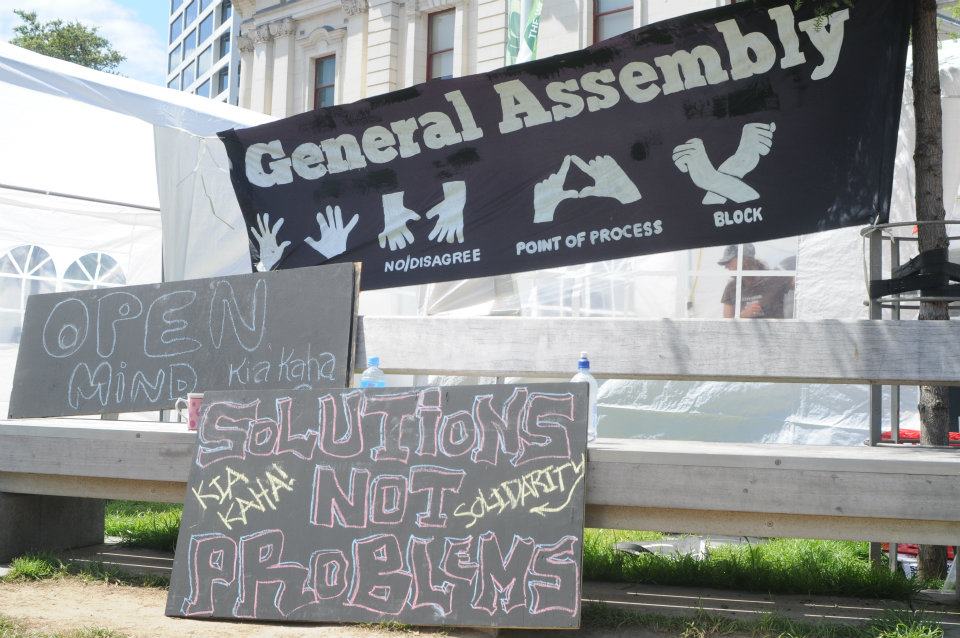27/10/2011
Dear colleagues and networks
A global revolution of the people is taking place right now and with our sectors’ input, it could create just the kind of social conditions our community needs to empower all people to live flourishing lives. For this reason, we are actively supporting this movement in Auckland and we urge you to take part too.
As a key stakeholder in the Auckland mental-health and disabilities sector, you probably already know that we have the highest rate of youth suicide in the developed world and that our youth are more likely to die from suicide than any other cause. Almost 50% of our community faces mental health problems in their life-times and only 16.9% of us have access to specialised treatment. Despite this, our government has removed mental health from the nation’s health priorities and cut funding to core mental health services across the country and we have all been feeling the effects. The Occupy movement is a revolution against this governmental shift away from the wellbeing of our communities and onto the wellbeing of big business. The movement’s impact depends entirely on the people who take part and it makes sense for the mental-health and disability sector to take part.
You probably won’t have heard about Occupy in the media, but information is widespread on social media networks. The movement has spread across the globe since thousands of Americans occupied Wall Street in New York on September 17th to collaborate in peaceful protest. In multitudes of cities across the world, communities have occupied their public spaces to peacefully demand that their governments take care of the interests of ordinary people (the 99%), over the interests of big business (the 1%). Each Occupation has set up a daily General Assembly that practices consensus decision-making that allows everyone present to be part of deciding what the local issues are and how they should be resolved. Absolutely everyone in the community is invited to participate in the daily General Assembly and have their perspective represented in the process.
In Auckland on October 15th two thousand people from all walks of life marched down Queen Street and occupied Aotea Square. Many are still there and they need our support if they are to achieve a meaningful result.
There are three ways that you or your organisation can join the Occupy movement to bring mental-health and disability issues into the picture and stand up for the human rights of the 99%.
- Outreach: Help the movement reach the public by visiting the occupation and adding yourself to the count. You don’t have to camp, though you are welcome to. A lot of people have jobs and family commitments and can only make it down for a few hours every couple of days. Every single body counts and there are so many things to be done that you or your organisation can help with. Anyone can join a working group or put a proposal to the General Assembly. The more diverse the occupiers are the better – every voice needs to be represented so that the consensus reached is a meaningful one with numbers behind it.
- Education: Share your knowledge with the occupiers by presenting a Learn Session on-site in the occupation. Not only is this an excellent way for you to spread your message amongst an incredibly diverse group of people, it is also an excellent way to help equip the occupiers with the knowledge they need to inspire positive change in New Zealand.
- Public Support: Show that you support the movement by publishing a Statement of Solidarity with the local Occupy movement, like this one. If you don’t have time to make your own Statement of Solidarity, simply forward this letter amongst your own networks. You might also like to publish witness accounts of what is happening at the camp and how the lives of the extremely diverse occupiers have changed for the better since participating in their communities through the Occupy movement.
This movement is about more than politics – it is about people uniting for a better world – and in the camps, a model of that better world is being played out. I have seen firsthand people meeting people they would not otherwise meet – and they are learning from each other. I have seen all people feeling included, people volunteering and participating, people finding comfort in each other, building a safe space and finding value in work and rediscovering their own skill-sets, people healing each other, all at Occupy Auckland.
Come to Aotea Square and experience it for yourself. General Assemblies are daily at 6pm. Learn Session days and times vary and are posted on the information board. A welcome tent holds all of the information you need and a friendly person to fill you in.
Sincerely in solidarity with Occupy Auckland
Miriam Larsen-Barr
Engage Aotearoa
This letter and the perspectives contained therein were unanimously approved by the Occupy Auckland General Assembly on 27 October 2011 at Aotea Square.









